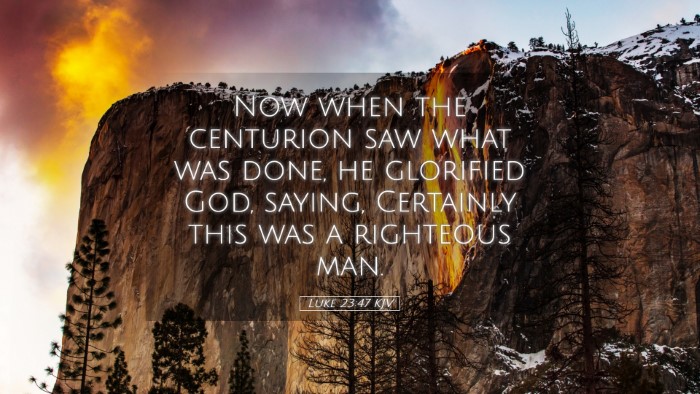Commentary on Luke 23:47
The verse Luke 23:47 states:
"Now when the centurion saw what was done, he glorified God, saying, 'Certainly this was a righteous man.'" (Luke 23:47, NKJV)
This verse captures a pivotal moment in the crucifixion narrative, revealing profound theological implications and human responses to the divinity of Christ in His final hours.
Contextual Analysis
The setting of this verse is the crucifixion of Jesus—a moment marked by darkness, despair, and divine fulfillment. The centurion, a Roman soldier, plays a significant role in the realization of Christ’s true nature as the Son of God.
Historical Significance
Matthew Henry notes that the presence of the centurion—a Gentile—underscores the universal reach of the Gospel. This moment signifies the expanding inclusiveness of God’s grace and the recognition of Christ’s authority beyond the Jewish people.
The Reaction of the Centurion
Albert Barnes emphasizes the centurion's declaration, "Certainly this was a righteous man," as a critical acknowledgment of Jesus' integrity and character, contrasting the actions of those who condemned Him. This moment demonstrates that even amidst violence and cruelty, truth can emerge.
Theological Implications
This passage contributes to the themes of righteousness and recognition of divine justice. Adam Clarke explains that the centurion’s declaration acts as a divine pronouncement of Christ’s innocence, affirming the truth of Jesus' mission and His identity as the Messiah.
Righteousness Revealed
Henry’s commentary expands on the idea of righteousness by elucidating that the centurion, a man often associated with power and military might, recognizes something inherently divine in Jesus' demeanor during His greatest suffering. This revelation challenges prevailing notions of power.
Glorifying God
Notably, the centurion glorified God upon witnessing these events. This act of glorifying God signifies a transformation of heart—a response to divine revelation. Here, Clarke notes that acknowledging God in crises can lead to authentic worship and a deeper understanding of Jesus' mission.
Lessons for Believers
This passage encourages believers to reflect upon how they acknowledge Christ in their lives. It poses penetrating questions regarding recognition and response to God's work, even in the face of suffering and injustice.
- Recognizing the Divine in Suffering: Just as the centurion recognized Christ’s righteousness amid His suffering, Christians are called to seek the presence of God in their trials.
- Inclusion of Gentiles: The centurion's comment symbolizes an openness to all people, highlighting the salvation offered through Christ which transcends ethnic and cultural boundaries.
- Witnessing as a Form of Worship: The act of glorifying God becomes a powerful witness to others, encouraging believers to live lives that reflect the righteousness of Christ.
Conclusion
Luke 23:47 serves as a compelling reminder of the truth of who Jesus is and the recognition of His divinity by an unlikely witness. The centurion’s proclamation not only affirms the nature of Christ but also initiates a pivotal shift in understanding the nature of God’s kingdom—a kingdom where the last shall be first and the first shall be last. This moment invites pastors, students, theologians, and scholars to explore deeper themes of faith, inclusion, and the multifaceted nature of God’s grace as demonstrated through Christ's ultimate sacrifice.


